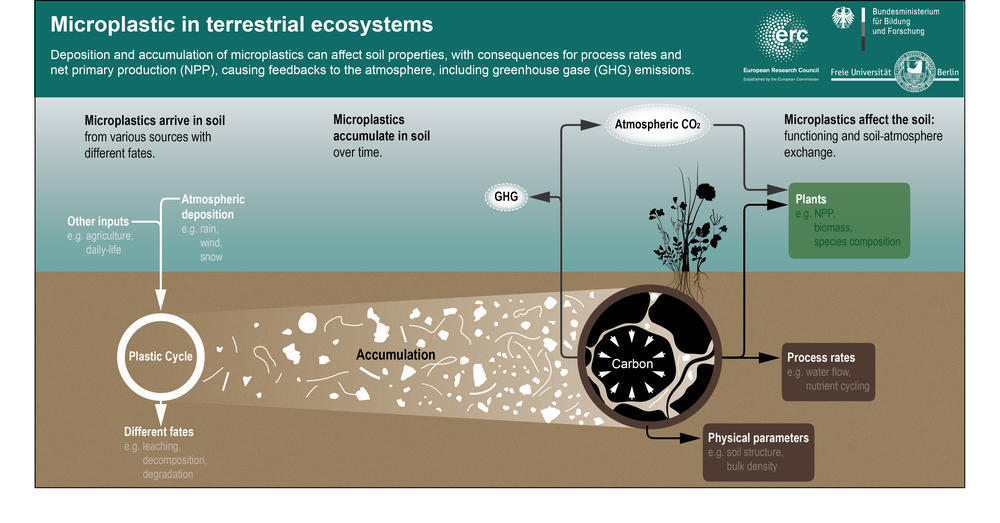Impact of Microplastic in Soil on the Ecosystem: Research is entering a new phase
Scientists at Freie Universität Berlin are studying the effects of microplastics in the soil
№ 109/2020 from Jun 25, 2020
Ecologists at Freie Universität Berlin examine and evaluate the effects of microplastics in soils on terrestrial ecosystems. Prof. Dr. Matthias Rillig and Dr. Anika Lehmann published an article in Science giving an overview of research efforts in this area, a factor in global change. Professor Matthias Rillig pointed out that scientific work on microplastics (< 5 mm) in soil started about ten years later than the investigation of these plastic particles in the ocean, where they are more obviously visible and where detection methods are relatively easier to use. In their study, he and co-author Annika Lehmann argue that it is important to focus more on the Earth system. Many effects of microplastics in soil could change processes that can affect the Earth system. Changes in greenhouse gas emissions from the soil and changes in the primary production of plants are perhaps the most important components. Different experiments are necessary in order to understand these consequences, namely approaches in the field with complex communities and broad international cooperation.
“Research into microplastics in the environment started with a typical ecotoxicological approach, that is, with experiments on possible toxic effects on organisms in the soil,” explains Rillig. This work was carried out under controlled conditions and often also on individual model organisms. Subsequent work (since 2017) examined processes in the soil, for example, soil aggregation, and therefore increasingly pursued an ecosystem approach. Scientists are now seeing microplastics as a factor in global change instead of primarily as a toxicological problem. “It took a while to change the perspective in our laboratory, too, but that had important consequences because it means that we structure our studies differently and ask different questions,” says Rillig. Using the global change approach, it is also easier to classify nominally positive measurement results. The effects of microplastics are often associated with a positive result, for example, that plants grow better when the soil is loosened. Nevertheless, it is necessary to interpret such positive effects in light of changes due to microplastics, and such changes should then be interpreted as an undesirable transformation. “For example, in a greenhouse experiment in our laboratory, there was a shift in the community of plants with microplastic, while the total biomass of the plants was higher,” explains Rillig. The relative frequency of plant species had shifted as a result of the microplastic treatment of the soil.
Professor Rillig and his team hope that potential effects of microplastics can be discovered by changing the focus of the research. He says, “Especially against the background of the coronavirus pandemic, which may have led to a somewhat less concerned approach toward disposable plastic, it is important to keep in mind that global change is a very big challenge for us and is already here.”
Press Images
Red polypropylene (polypropylene) microplastic fibers in a soil aggregate.
Image Credit: Anika Lehmann
Microplastics in soil and the associated feedback in the ecosystem.
Image Credit: M.C. Rillig/A. Lehmann
The photo and diagram are available for journalists to download and are free of charge when used in the context of the press release.
Further Information
The Publication
Rillig MC, Lehmann A. (2020): Microplastic in terrestrial ecosystems, in: Science, DOI: 10.1126/science.abb5979
Contact
Prof. Dr. Matthias C. Rillig, Institute of Biology, Freie Universität Berlin, Tel.: +49 30 838-53165, Email: matthias.rillig@fu-berlin.de


